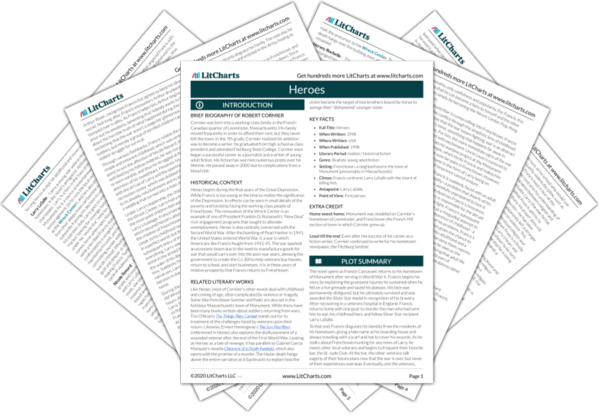Summary
Analysis
Francis resumes his childhood flashback with his most painful memory of all: Larry’s return from the war after being awarded the Silver Star. Initially, though, Francis and the other Wreck Center children are excitedly awaiting the return of their hero at the Monument train station. When Larry at last arrives, “resplendent” in his uniform with its medals and ribbons, he is greeted with cheers and jubilation.
Symbolically, Larry’s return is the arrival of the war not just in Frenchtown, but also in Francis’ immediate life. Still though, as Larry steps off the train in his military uniform, he remains a hero to Francis and the other Wreck Center children, who have been conditioned at this point to view all soldiers as heroes.
Themes
While Larry still has the touch of movie star grace that he had before the war, Francis notes how there was a certain lethality to Larry now, a sharpness around him that made it easy to envision him storming up a hill with guns blazing.
Again, Francis’ subtle remarks about Larry hint at the possibility of a darker, violent side to Larry, one that contrasts with his gentle demeanor as a teacher and a hometown hero.
Themes
Quickly, the mayor of Monument cuts through the crowd to announce a big celebration at City Hall in honor of Larry. Larry responds with gratitude, also announcing to the crowd how thrilled he was to be back with his Wreck Center crew.
The mayor, symbolically the government, shows how even the small town of Monument is engaged in shaping perceptions of the war, choosing to celebrate their local “hero” for his medal without dwelling on the implications of violence that it carries.
Themes
At the celebration, Larry eventually gathers his crew and together they discreetly slip out of the party, carousing through the streets until they arrive at the Wreck Center that Larry had gotten unlocked for the night. Everyone floods into their old haunt, playing Ping-Pong and dancing late into the night, until only Francis, Nicole, and Larry remain.
Larry is symbolically leading the Wreck Center children back into their childhood. While it seems like a benevolent gesture towards his former students, there is an air of uneasiness about a combat veteran leaving a celebration in his honor to spend time with teenagers.
Themes
Get the entire Heroes LitChart as a printable PDF.

Since all the others have left, Larry asks Nicole to go put on “Dancing in the Dark:” the song the two had danced to often before the war. Taking Francis aside, then, Larry says Francis must be tired and that maybe he should head home. When Francis protests, Larry explains how he wants to have one last dance alone with Nicole, his star pupil. Unsettled, Francis still assents mechanically to Larry’s orders, even as Nicole begs him to stay. Ultimately unable to disobey his hero, Francis turns to leave the Wreck Center.
For the second time in the novel, Francis is pitted against his mentor. Much like how Larry guided the Ping-Pong game from the start, he manipulates Francis into believing that he is tired. When Francis is unable to overcome his uneasiness and take a stand against his hero Larry, he shows that he is still bound up in his childish view of the world where adults are in charge and supposedly good people are incapable of evil.
Themes
As Francis draws near the exit, Larry flicks off the lights, and Francis suddenly decides he cannot fully abandon his sweetheart, hiding himself in the shadows as the other two dance. Hidden in the doorway, he begins to hear signs of a struggle as Larry rapes Nicole. Paralyzed by fear, Francis is unable to intervene.
In this moment, Francis’ childhood is destroyed. His childhood haunt being plunged into darkness symbolizes the irrevocable staining of his childhood. His idea of heroics now shattered, Francis is faced with his first “real” struggle and is unable to react to it.
Themes
Bursting through the darkness, a battered Nicole goes to leave the Wreck Center, spotting Francis as he steps out from the shadows towards her. Nicole, however, waves him off, her eyes full of anger and betrayal. Shaking her head in disbelief, she flees into the night, slamming the door behind her. Numb, Francis withdraws back into the shadows.
With this act of violence against Nicole, Francis’ childhood is over. He feels that he now has betrayed the girl that was his entire world, and as she flees into the night, so too does his simplistic childhood disappear.
Themes
Larry, unaware that Francis had witnessed his horrendous crime, leaves the Wreck Center, casually whistling “Dancing in the Dark.” With his exit, Joey LeBlanc’s prophecy of doom returning to the Wreck Center is fulfilled.
Symbolically, Larry represents the violence of war, since he came home a “war hero.” His casual demeanor after his horrendous crime shows how the violence of war is often written off or downplayed.
Themes












